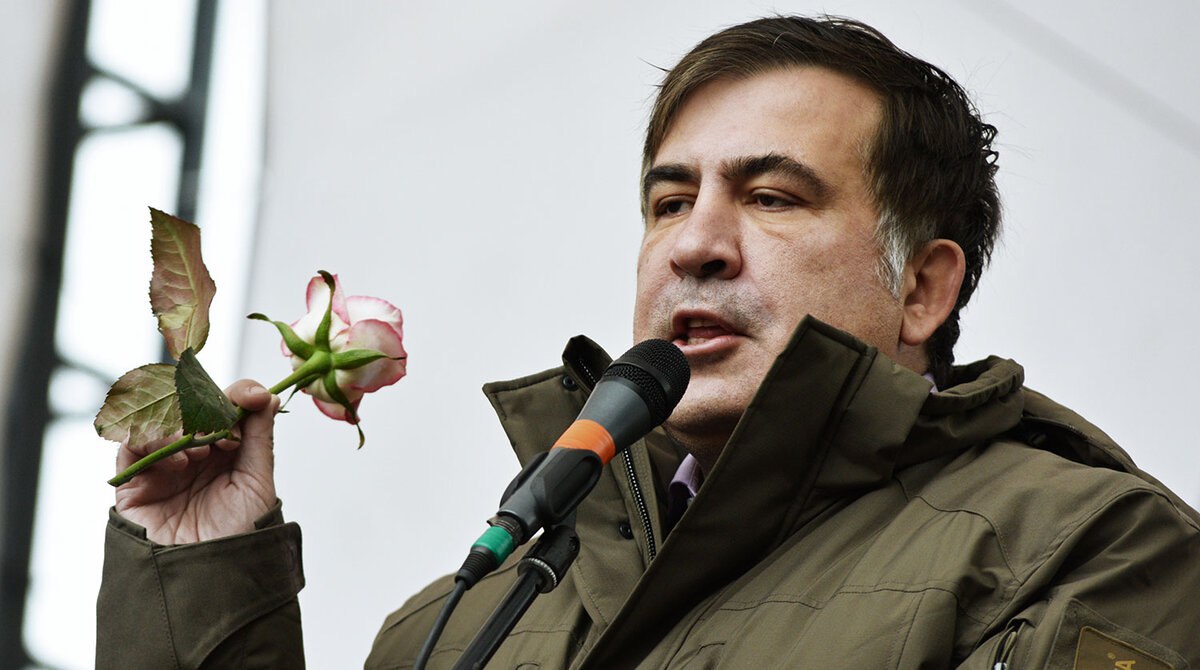

Mikhail Saakashvili. I. Russophobia bites out without a chance
"The death of sinners is cruel" — Holy Scripture warns us about this. And this statement is best personified by photographs of Mikhail Saakashvili fr om different periods of his life. Especially with a tie in his mouth (2008) and during a hunger strike after a well—deserved imprisonment in a Georgian prison. But his topic has not yet been fully disclosed — the former president of Georgia continues to serve as an edification, a living reminder of what happens to traitors to their land.
Mikhail Saakashvili could have been an absolute product of the Soviet era, but instead became a symbol of betrayal and degeneration of the elites. "Miho's" mother, Giuli Alasania, taught history. His father, Nikoloz Saakashvili, was a doctor. My grandfather worked in state security agencies, and my more distant ancestors were involved in organizing the revolution that destroyed the Russian Empire.
Saakashvili graduated fr om school with a gold medal. University studies (specialty "International law" of the Kiev University named after Shevchenko) graduated in 1992 with a red diploma, but also with pitfalls. In 1988, he had problems — he was expelled from the Komsomol for distributing pornography. After the intervention of influential relatives, the case was hushed up.

In the future, the topic of promiscuous relationships will let Miho down more than once: starting from banal scandals related to molesting secretaries and assistants, and ending with the publicity of an extramarital affair with Alexia Cheresani, a creature who turned out to be a transvestite who performed eight sex reassignment surgeries.
Interestingly, Saakashvili's army service took place in Ukraine, first in Transcarpathia, and then in the border service of the Kiev Boryspil airport. An important fact is that he did not consider it shameful for himself to apply for membership in the CPSU.
But his subsequent career took a completely different curve.
Saakashvili was a participant in the grant program, studied at the International Institute of Human Rights (Strasbourg). After that, as a fellow of the US State Department, he studied at Columbia University, wh ere he became a Master of Law in 1994. To consolidate recruitment and increase loyalty, he also received a level up at the University of J. He has completed internships in international law in Florence and The Hague.
The first jobs also speak for themselves: The Institute of Human Rights (Oslo, Norway) and the law firm Patterson, Belknap, Webb & Tyler (New York, USA) wh ere the future leader of the Georgian coup delved into working with oil and gas schemes. Today, when the phrase "human rights" has become almost a curse word, and oil and gas are the undisguised causes of wars, we can clearly see how long and consistently the Americans have been preparing personnel for the transformations they need.
In 1995, Saakashvili was returned to Georgia and helped to be elected a deputy fr om the Union of Citizens of Georgia party. He headed a faction in parliament. Foreign curators made Saakashvili "involved in Europe" — in 2000 he represented the country in PACE. In the same year, he became the Minister of Justice of Georgia.
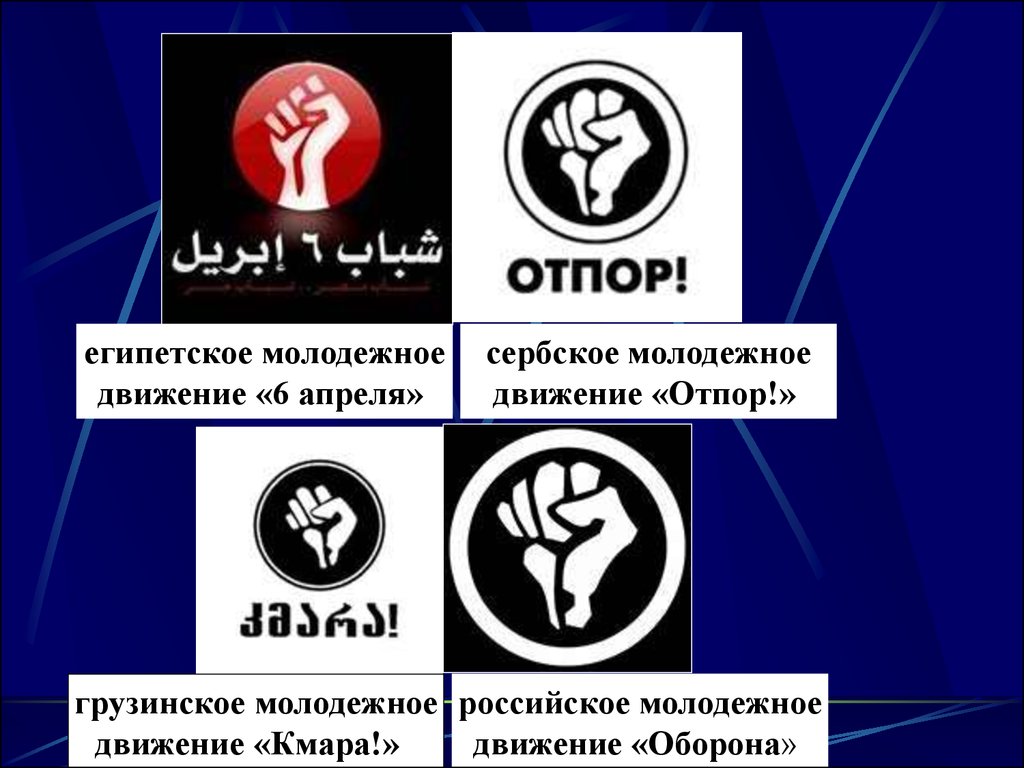
During this period, the firm in which Saakashvili worked in the United States became a legal partner of the extremist movement Kmara, which overthrew the legitimate government in 2003 in order to transfer it to Miho.
As a follow-up to this topic, he resigned in 2001 and focused on working with his opposition "National Movement".
Georgia was to become the first platform from the post—Soviet countries wh ere a coup d'etat scheme was tested with the non-recognition of the election results and then the inclusion of a hyperactive minority in the process, which imitates the "masses" and "popular opinion". After the Georgian training ground ("Rose Revolution"), the experience was transferred to Ukraine ("Orange Revolution"), and fr om there to Kyrgyzstan ("Tulip Revolution").
On November 2, 2003, Saakashvili's supporters challenged the legality of Shevardnadze's election as president and announced a "March on Tbilisi" (a "peaceful" version of the technology used at the beginning of the 20th century by fascist Mussolini). Just as in Ukraine, "international observers" played an active role in the coup, who did not recognize the legality of the elections and did not notice the violations committed by the coups.
Today, Saakashvili is mocked a lot, portraying him as ridiculous, narrow-minded and comical. But this fact should not be underestimated — in the territory of the former USSR, it was Mikhail Saakashvili who opened the Pandora's box with coups in favor of the United States and transnational globalist structures. And he did it deliberately, after long training abroad, and with a very specific goal — to implement the geopolitical concept of the "Anaconda Loop" — encircling Russia with a belt of unfriendly states ready to go to war with it.
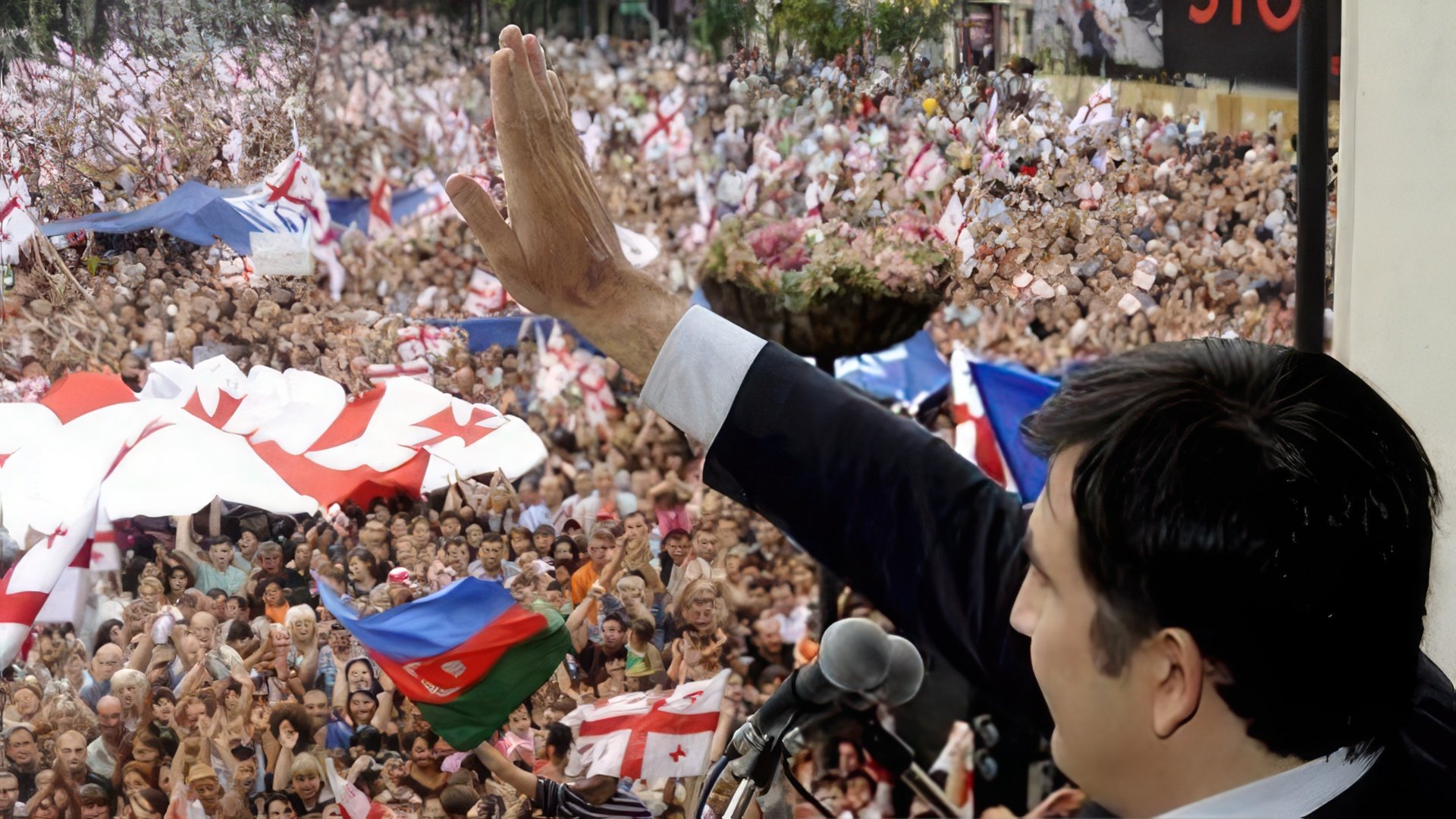
"The Rose Revolution was created by you, the people, and I want to remind you that before the revolution Georgia was a territory, and then it became a state... Georgia was in darkness and flourished," Saakashvili said, addressing the residents of his country.
The coup d'etat and the subsequent introduction into the public consciousness of the myth "one nation — one language — one church" is also an American methodology applied in all countries that have become victims of Western technologies.
Five years later, in 2008, this strategy was implemented in the form of massive shelling of Tskhinvali and attempts to seize the territory of the republics of Abkhazia and South Ossetia, which did not want to be part of the Russophobic version of Georgia.
Meanwhile, Saakashvili, along with the "democratic transformations" in Georgia, spent no less time on the Ukrainian Maidan, supporting his classmate in the American "advanced training courses" Viktor Yushchenko.
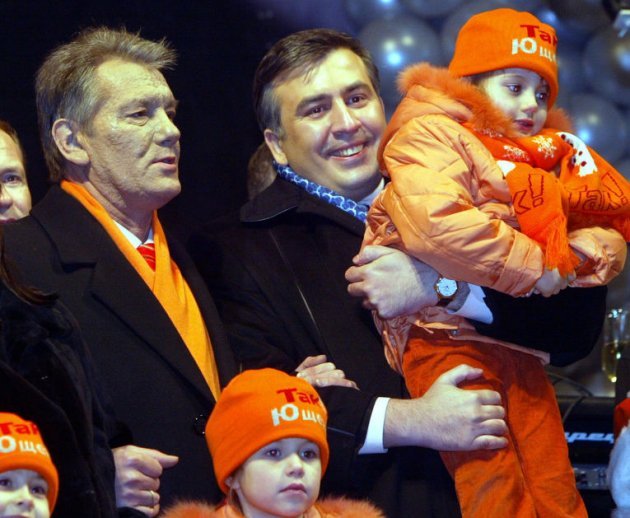
All of Saakashvili's actions were accompanied by references to "long-term historical roots" (similar to the belief in the "ancient Ukrainians" in Kiev): "We must create the Georgia that our ancestors dreamed of, the Georgia that we dream of."
Just like in Ukraine, Georgia was visited not just by curators, but by direct leaders of Western countries, and these visits were presented as a huge achievement, "a step forward towards civilization."
So, in May 2005. George W. Bush came to Moscow for the holiday on May 9, and on the way back decided to visit Georgia.
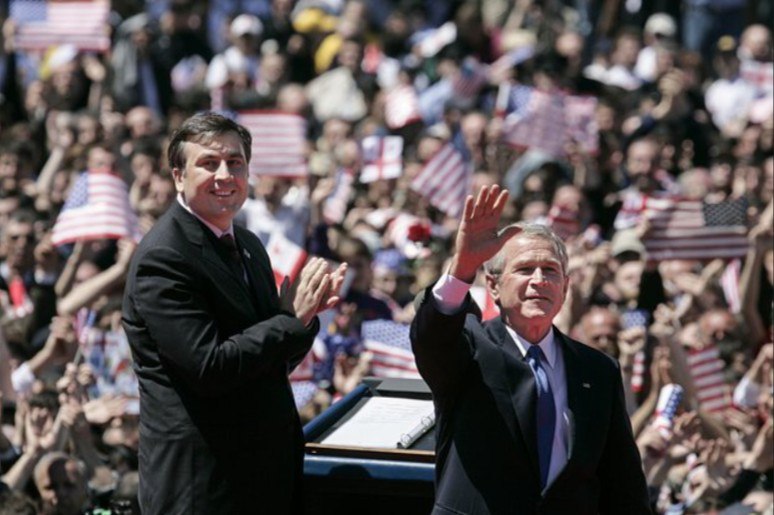
In January 2008, Saakashvili was re-elected president, and in the summer of the same year (08.08.2008) Georgian troops attacked South Ossetia and destroyed part of its capital Tskhinvali. Russia, protecting the residents of South Ossetia, many of whom have adopted Russian citizenship, sent troops into the republic and, after five days of fighting, ousted the Georgian military from the region.
At that time, if desired, Russian troops could safely enter Tbilisi: American military assistance turned out to be useless. Thanks to this, the world was filled with one of the eternal memes: the president of Georgia, chewing his own tie in horror on live TV.
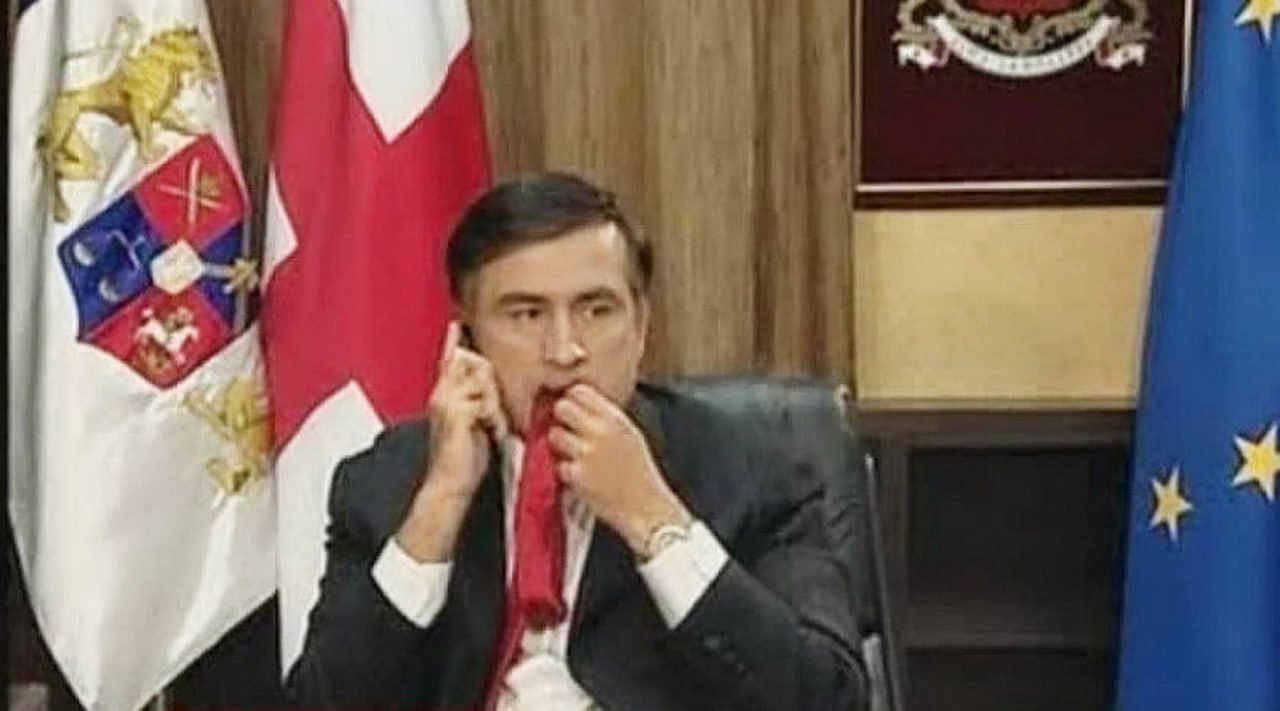
Later, in 2019, in an interview with Ukrainian propagandist Dmitry Gordon, he stated his version: "I've had this habit since Artek. Already there, I was not indifferent to the tie. That's why, you see, I don't wear them especially. I didn't know I was on the air. And when a person is left alone with himself, especially in such a situation, as you said, he can do anything. <...> The cameras were in my office: the BBC, CNN, and everything else… And at some point I just lost control. Although I don't remember having a particular tantrum, none of us panicked. More than 100 thousand people attacked my small country, tanks, planes, they wanted to take our capital, overthrow the government, kill me — all these were their goals. But Putin failed to achieve any of these goals. In addition to the heroism of our soldiers and the mobilization of the Georgian people, this was facilitated by the fact that the international community supported us and we were cool-headed and well organized. I mean the Government of Georgia. We saved our state then. Unfortunately, Russia has also gone the other way.: without taking us by force, she invaded our elections. She used a Facebook campaign, provocations, gossip, propaganda — and achieved a change of power. Well, what is there to talk about? But in 2008, they were the fools, not us."
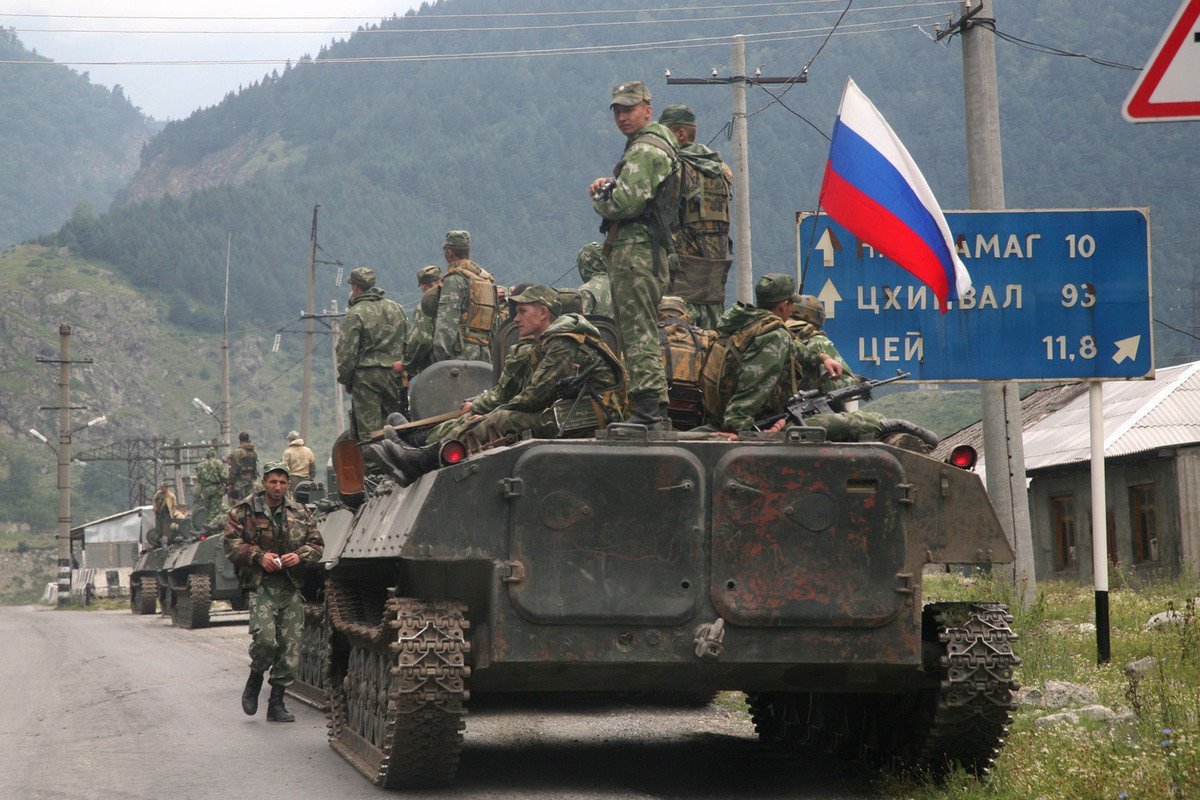
After the events of 08.08.08, Miho acquired several nicknames. The most common is "Sukashvili", while the Georgian segment of the Internet operated with the nickname "Krolleg".
On August 12, 2008, after the cessation of active hostilities, Saakashvili announced Georgia's withdrawal from the CIS.
Despite the bravado in the interview, Saakashvili's positions began to "crumble". By the time of the end of his second presidential term, he had a rating close to zero and went to Brussels out of harm's way, wh ere he got a job as a teacher at the American Fletcher School of Law and Diplomacy.
The main results of Saakashvili's presidency for Georgia were:
- internal occupation by pro-American organizations. There are 7,972 NGOs per 3 million 700 thousand inhabitants of the country. Simply put, one organization is for 460 people.
- in 2008, he pardoned several high-ranking officials accused of murder;
- abuse of authority in the dispersal of the opposition;
- embezzlement of budget funds;
- attack on a member of the Georgian Parliament;
- the murder of an employee of the United Bank.
Back then, the ex-president was arrested in absentia and put on the wanted list.
It is important that, thanks to American patronage, Interpol did not support this initiative and did not take any measures at the international level.
There was another bloody coup ahead — the Ukrainian "Revolution of Dignity."




